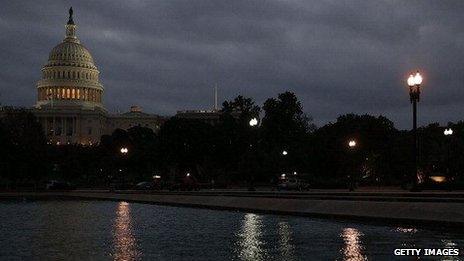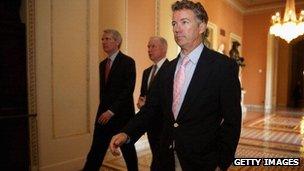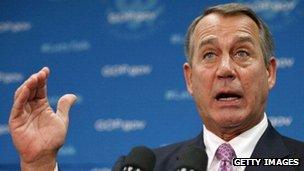Hard-line conservatives see victory in debt limit standoff
- Published
- comments

A faction of the Republican Party believes it cannot lose the battle over raising the US government's borrowing limit - either they dismantle the Democrats' healthcare reform, or the country has to live within its means for a while. But will the rest of the party stick with them?
It is a high-stakes gambit - the US has never before breached its authority to borrow money to fund its obligations, and most experts warn it could be catastrophic.
But a group of hard-line conservatives in Congress think it is worth the risk.
Republican Silver Bullet
Dozens of Republican politicians, such as Steve King of Iowa, Tim Huelskamp of Kansas, and Mick Mulvaney of South Carolina, have suggested in interviews, external that the US government could prioritise its payments in the event of a debt limit breach, choosing to fund some government expenses - while drastically cutting others.
"If you don't raise the debt ceiling, what that means is you have a balanced budget," Republican Senator Rand Paul of Kentucky said on CNN, external last week. "It doesn't mean you wouldn't pay your bills."
The strategy hinges on convincing President Barack Obama that conservatives are willing to break the debt ceiling and devastate the Democratic Party's government priorities, while assuring Republican big-business backers that this would not destroy the economy.

Senator Rand Paul says the US will continue to pay its bills even if it hits the debt ceiling
It is a fine line, but conservative grass-roots groups think they have found the silver bullet to kill Mr Obama's 2010 healthcare reform law, which Republican Representative John Fleming of Louisiana called in typical remarks "the most dangerous piece of legislation ever passed in Congress".
If the debt limit is breached so that "Obamacare" can be destroyed and Americans be taught they can live with less government, so be it.
"Liberals might be so concerned about settling this issue because they do not want Americans to realize that we can survive just fine with a lot less government spending," Jeffrey Dorfman writes in Forbes, external. "Perhaps we will be better off in the long run if government gets a little taste of what so many families have been experiencing for years: staying within a budget."
First-term Republican Representative Ted Yoho of Florida said in an interview with the Washington Post, external that hitting the debt limit would "bring stability to the world markets", as it would prove the country is serious about balancing its budget.
'It's stupid'
Without the risk of a sovereign debt default, and with Democratic interests feeling the pain of a predicted 32% cut in overall government spending, the theory goes, Republicans would finally have a negotiating advantage.
"We hit the debt ceiling, and the world won't end," says Dean Clancy, vice-president of public policy for FreedomWorks, a conservative grassroots activism group.
"Once the public and Wall Street understand that default is not really a possibility, the president's leverage will be greatly diminished and a bipartisan compromise will be achievable."
Other Republicans counter that such a strategy is both impractical and dangerous. Even if the treasury department could figure out how to prioritise payments, the uncertainty created by such an action would devastate financial markets.
"The issue here is honouring our debt obligations," says Bill Hoagland, a senior vice-president at the Bipartisan Policy Center who served as a budget aide to former Republican Senate Majority Leader Bill Frist.
"It's stupid, and it's unbelievable we're even having this conversation."
Speaker of the House John Boehner, a reluctant recruit to the current budget fight over healthcare reform, has shown hesitation to take the plunge with the conservative caucus once more.
Although he continues to assert that his party is united, there were reports in the media, external last week that he told nervous colleagues that he would not allow a default on the debt - even if that meant relying on Democratic support to pass a debt limit increase.
Civil war

House Speaker John Boehner says his Republican caucus is united
According to Republican campaign strategist and pollster Matthew Towery, the hard-line conservatives will soon learn their plan is unworkable.
As in the economic crisis of 2008, when Congress did not pass an economic rescue bill until the stock market took a 700-point drop, rank-and-file Republicans will turn once the financial markets show signs of stress, he says.
"The president has blatantly stated that Wall Street should be concerned," Mr Towery says. "He wants a drop, as he knows what that would do. They would have to take immediate action."
At that point, enough Republicans would come around to give Mr Boehner cover to bring a debt limit increase to a vote in the House.
"The [Republican] House majority has a pack mentality until things start to go wrong," Mr Towery says. "Once that happens, Boehner not only will have the votes, he'll probably get a majority of the conference to go along with him."
As the debt limit approaches, what has been termed a Republican "civil war" between hard-line conservatives and the party establishment may be approaching its end game.
The conservative caucus has proven it is willing to continue to escalate the standoff until it achieves unconditional victory. With strong backing from voters at home and a view the "Obamacare" healthcare reform is an existential threat to the country, compromise is not an option.
At some point, however, the rest of the Republican Party may decide it is ready to get off this ride.
"I think Republicans just want out of this mess altogether," Mr Towery says.